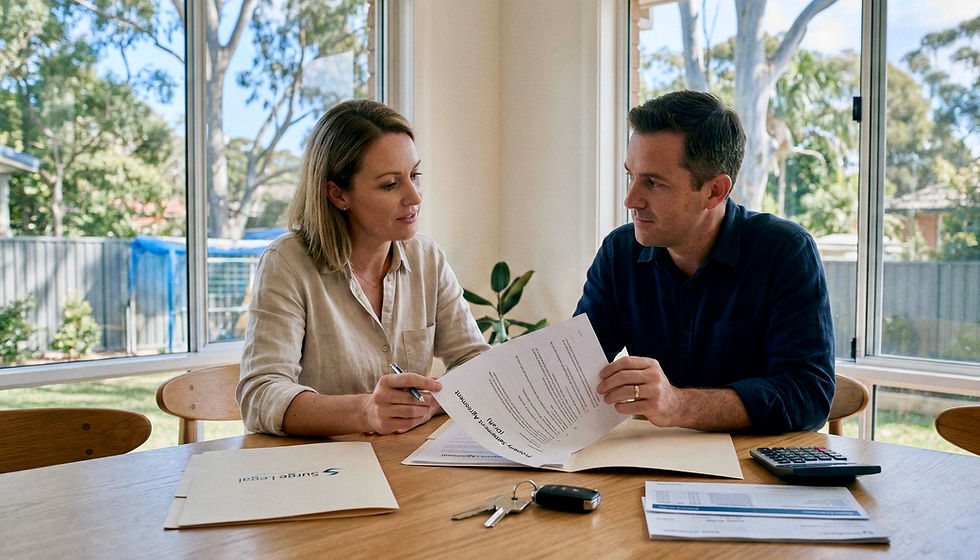"Mirror Wills" For Couples
- Surge Legal

- Apr 22, 2023
- 3 min read

“Mirror Wills” are nearly identical Wills made by two people, usually a married or a de facto couple. When executing Mirror Wills each spouse usually leaves their assets to the other spouse upon their death, and when both have passed away, the assets are then divided in the same proportion among their children.
Let us examine a scenario where executing Mirror Wills would be suitable and another scenario when this would not be appropriate.
Scenario 1
Let’s take an average elderly couple living in North Sydney – David, aged 86 and Kate aged 82. They want to leave all their assets to each other and when both of them die to their 3 children in equal shares - Annie, Andrew and Michael. The only substantial asset they have is a real property located in Chatswood worth approximately $2.2 million. They own this home as joint tenants. They have some super and some savings, but no other assets.
Since David and Kate want to leave their assets to each other and, eventually, to their three children, it would be suitable for them to do "Mirror Wills".
As David and Kate own their Chatswood property as joint tenants, this means that upon the death of one of them, the property will automatically pass to the surviving spouse. This is due to the right of survivorship, which is a feature of joint tenancy. Therefore, the property will not be subject to probate or the terms of their Wills. However, when the surviving spouse receives the full share of the property, the Estate of the surviving spouse will include the Chatswood property for distribution to the parties’ children.
It is important to note that Superannuation is not considered part of the Estate and is not directly dealt with in a Will. David and Kate should consider making binding death benefit nominations with their Superfund. Essentially, a binding death benefit nomination is a binding written direction to the superannuation trustee directing the trustee to distribute the member’s superannuation death benefits in a certain way.
Lastly, as David and Kate are making Mirror Wills, they would normally each other as an executor in their Wills, which is the person responsible for carrying out the terms of their Wills and administering their Estates. Instead of nominating each other as an Executor, they can also choose to appoint a trusted family member, friend, or a professional executor, such as a solicitor.
Scenario 2
Now let us imagine that David and Kate have a slight disagreement and want to leave their respective assets in different proportions to their children. David intends to give 80% of all his assets to Michael and the remaining 20% equally between Annie and Andrew, while Kate wants to distribute all her assets equally between the children.
David and Kate would no longer create mirror Wills, as their wishes for the distribution of their assets are different. Instead, they would each have a separate Will prepared to reflect their individual intentions. Each Will would clearly outline the desired distribution percentages for their respective assets to each child.
Most importantly, to address the individual distribution wishes, David and Kate would need to sever the joint tenancy upon making of the Wills and convert the property ownership to tenants in common in equal shares. This would allow each spouse's share of the property to be dealt with according to their individual Wills. This step is extremely important, due to the fact that if the joint tenancy is not severed, the property will not be subject to probate or the terms of the Wills and the surviving spouse will receive the full share of the property regardless what the Wills state, as per Scenario 1 above.
As with the previous example, David and Kate should still consider nominating binding death benefit beneficiaries with their superannuation fund. Each can nominate the desired beneficiaries in accordance with the proportions they wish to distribute their superannuation benefits. This may require different nominations for each spouse.
In their individual Wills, David and Kate should specify the desired distribution of their personal items and savings to their children in accordance with the proportions they wish to leave to each child.
By creating separate Wills that outline their individual wishes for the distribution of their assets, David and Kate can ensure that their estates will be distributed according to their individual preferences.
Lastly, for Scenario 1 and 2, David and Kate should review their Wills periodically to ensure they remain current and reflect their intentions, especially if their circumstances or wishes change.
While executing Mirror Wills is quite common for couples, this may not always be appropriate and it is essential to consult with a qualified Wills and Probate lawyer to draft and execute Wills and navigate any potential complexities, such as severing joint tenancies or making binding death benefit nominations. Contact Surge Legal now for a free initial consultation to discuss your Estate Planning needs.



